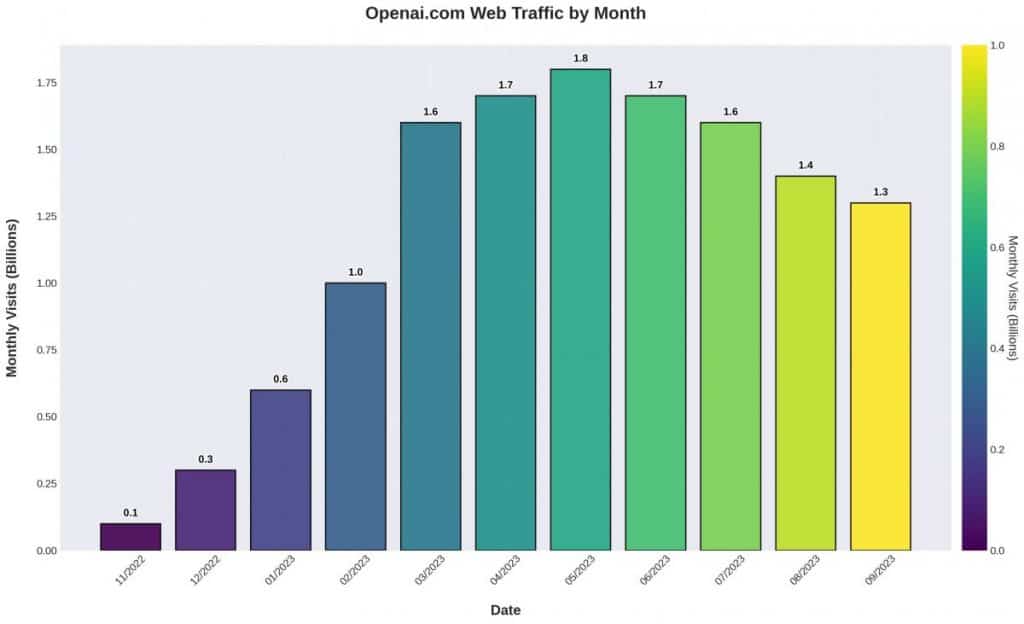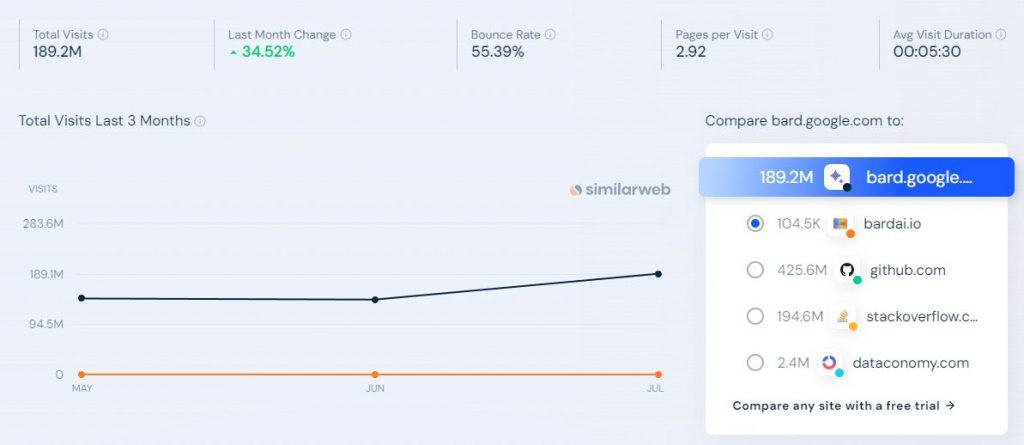ChatGPT Web Traffic Falls 20% in September and Continues to Plummet Down


In Brief
In September, global traffic to ChatGPT dropped by 20%.
Factors contributing to this decline include seasonal effects, shifting user behaviour, platform migration, and a competitive landscape.
In November 2022, OpenAI launched ChatGPT, a conversational large language model that quickly took the world by storm. From its inception to its peak in May, the website saw unprecedented growth, becoming what some analysts called “the fastest-growing web app in internet history.” However, recent data indicates a decline in traffic and engagement.

According to data from Similarweb, by January 2023, ChatGPT had attracted a staggering 100 million monthly active users. Its appeal lay in its capability, accessibility, and the fact that it was free. Users from all over the globe flocked to the platform to generate a variety of text outputs, from emails and essays to code snippets.
ChatGPT wasn’t just a tool; it was a sensation that contributed significantly to the AI hype. Its advanced natural language processing capabilities enabled it to perform a wide range of tasks, including question-answering and text summarization. This versatility led to a surge in chatbot applications and placed generative AI on the map in an unprecedented way.
However, all that glitters is not gold. Data from June revealed that global traffic to ChatGPT dropped by 9.7%, with a 10.3% decline in the U.S. alone. Unique visitor numbers fell by 5.7%, and user engagement dipped by 8.5% compared to May. This marks the first significant decline since the website’s launch.
One plausible explanation for the drop in usage could be the closing of schools for the summer. ChatGPT was popular for answering homework questions, and with students turning their attention to other activities like Minecraft, this could account for some of the decline.
Another possibility is that users are becoming more efficient in their interactions with the bot. Rather than spending time exploring its capabilities, they might be using it for more specific tasks, thereby reducing overall engagement time.
OpenAI offers its models via APIs and Microsoft Azure. The decline in website traffic might be attributed to users transitioning to these programmatic interfaces for more tailored uses.
ChatGPT’s decline comes amidst a broader context of market dynamics. For instance, Character.AI, another popular AI chatbot site, saw a 32% decline in traffic. Meanwhile, Google’s Bard is slowly gaining traction.

OpenAI has announced that its latest models, including GPT-4, are now generally available for API access. Older models based on GPT-3 will be retired by January 4, 2024, and replaced with newer systems. This could potentially rejuvenate interest and bring back some of the lost traffic.
The decline in ChatGPT’s web traffic doesn’t necessarily spell doom for the platform or for AI-powered chatbots in general. It might simply be a market correction, a seasonal fluctuation, or a sign of users becoming more focused in their interactions.
Would you like to discuss the article or have any other queries? Feel free to ask!
Read more about AI:
Disclaimer
In line with the Trust Project guidelines, please note that the information provided on this page is not intended to be and should not be interpreted as legal, tax, investment, financial, or any other form of advice. It is important to only invest what you can afford to lose and to seek independent financial advice if you have any doubts. For further information, we suggest referring to the terms and conditions as well as the help and support pages provided by the issuer or advertiser. MetaversePost is committed to accurate, unbiased reporting, but market conditions are subject to change without notice.
About The Author
Damir is the team leader, product manager, and editor at Metaverse Post, covering topics such as AI/ML, AGI, LLMs, Metaverse, and Web3-related fields. His articles attract a massive audience of over a million users every month. He appears to be an expert with 10 years of experience in SEO and digital marketing. Damir has been mentioned in Mashable, Wired, Cointelegraph, The New Yorker, Inside.com, Entrepreneur, BeInCrypto, and other publications. He travels between the UAE, Turkey, Russia, and the CIS as a digital nomad. Damir earned a bachelor's degree in physics, which he believes has given him the critical thinking skills needed to be successful in the ever-changing landscape of the internet.
More articles

Damir is the team leader, product manager, and editor at Metaverse Post, covering topics such as AI/ML, AGI, LLMs, Metaverse, and Web3-related fields. His articles attract a massive audience of over a million users every month. He appears to be an expert with 10 years of experience in SEO and digital marketing. Damir has been mentioned in Mashable, Wired, Cointelegraph, The New Yorker, Inside.com, Entrepreneur, BeInCrypto, and other publications. He travels between the UAE, Turkey, Russia, and the CIS as a digital nomad. Damir earned a bachelor's degree in physics, which he believes has given him the critical thinking skills needed to be successful in the ever-changing landscape of the internet.






















































